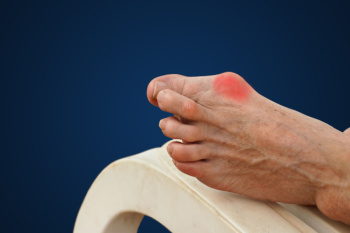
Bunions are a common foot deformity where the joint at the base of the big toe becomes enlarged and misaligned, causing the toe to angle inward. This can lead to pain, swelling, and difficulty in finding comfortable shoes. The condition often develops due to genetic factors, wearing ill-fitting footwear, or arthritis. If you have bunions, it is essential to take proactive steps to manage the discomfort and prevent further progression. Start by wearing shoes with a wide-toe box, low heels, and good arch support. Regularly performing foot exercises to strengthen the muscles around the joint can also provide relief. If these conservative measures do not help, or if the bunion becomes severely painful, it is suggested that you consult a podiatrist. In some cases, surgery may be recommended to correct the deformity and restore foot function.
If you are suffering from bunions, contact Pasquale Cancelliere, DPM of Candria Foot and Ankle Specialists. Our doctor can provide the care you need to keep you pain-free and on your feet.
What Is a Bunion?
A bunion is formed of swollen tissue or an enlargement of boney growth, usually located at the base joint of the toe that connects to the foot. The swelling occurs due to the bones in the big toe shifting inward, which impacts the other toes of the foot. This causes the area around the base of the big toe to become inflamed and painful.
Why Do Bunions Form?
Genetics – Susceptibility to bunions are often hereditary
Stress on the feet – Poorly fitted and uncomfortable footwear that places stress on feet, such as heels, can worsen existing bunions
How Are Bunions Diagnosed?
Doctors often perform two tests – blood tests and x-rays – when trying to diagnose bunions, especially in the early stages of development. Blood tests help determine if the foot pain is being caused by something else, such as arthritis, while x-rays provide a clear picture of your bone structure to your doctor.
How Are Bunions Treated?
- Refrain from wearing heels or similar shoes that cause discomfort
- Select wider shoes that can provide more comfort and reduce pain
- Anti-inflammatory and pain management drugs
- Orthotics or foot inserts
- Surgery
If you have any questions, please feel free to contact our offices located in Londonderry, NH and Salem, NH . We offer the newest diagnostic and treatment technologies for all your foot care needs.



